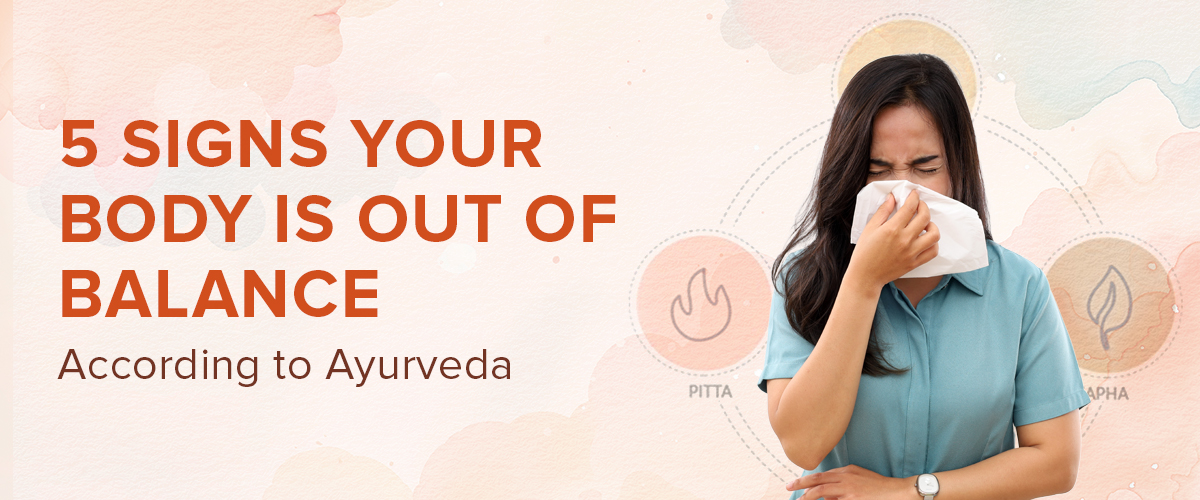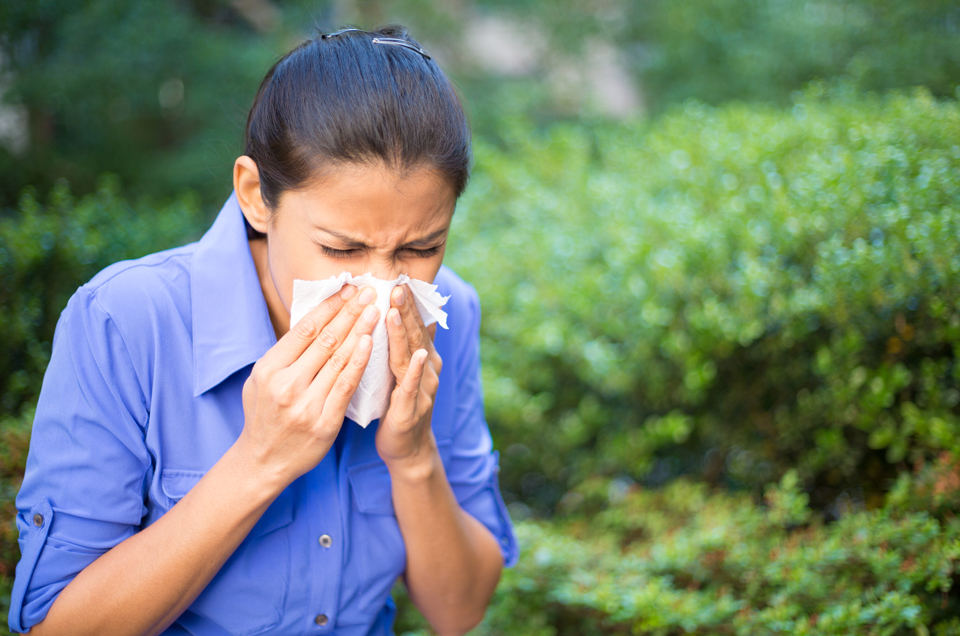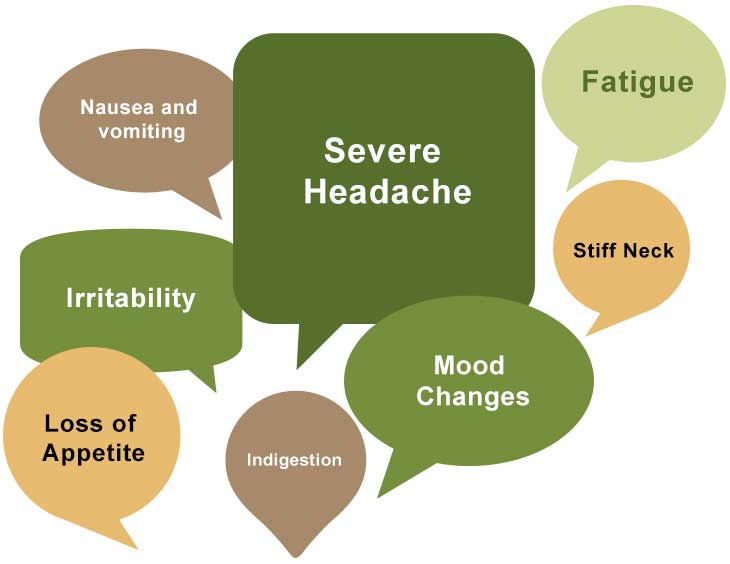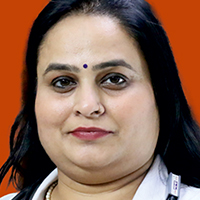In India, more than 50% of urban adults used AYUSH systems, mainly Ayurveda, for prevention or treatment of health issues in the past year, according to a MoSPI survey.
As per Ayurveda, your health depends on keeping three main energies, called doshas, in balance. These are Vata, Pitta, and Kapha. Vata is about movement and lightness, Pitta is about heat and change, and Kapha is about stability and structure. Your body sends signals that something is wrong when any of these energies get out of balance.
In this article, we will help you understand the clear signs that mean that your body is not in balance. We'll look at what each sign means from an Ayurvedic point of view so you can bring your balance back.
What Does Ayurveda Mean by a Body ‘Out of Balance’?
Ayurveda says that your body is healthy when the three doshas (Vata, Pitta, and Kapha) are in the right balance. Your body has a natural dosha mix, and when this mix gets out of balance, it starts to show signs.
Doshas are like the settings on your body. When everything is working right, your energy, digestion, mood, and even your sleep all feel good. But if one dosha gets too strong or too weak, you might start to feel "off."
This imbalance doesn't just affect your body. It has an effect on your mind as well. Here are some small but clear signs:
- If your skin is dry or cracked, it could be a Vata problem.
- Do you feel hot, angry, or get acne easily? That can be due to too much Pitta.
- Are you tired, bored, or having trouble doing tasks? Kapha might be too high.
Even though these signs may seem small, they are your body's way of asking for help. If you notice them early, you can do simple things to feel better.
Do You Always Feel Too Tired or Low on Energy?
Your body might be out of balance if you wake up tired, need to take naps during the day, or just don't feel like doing anything.
- Ayurveda says that chronic fatigue is often caused by an imbalance in Vata or Kapha.
- When you have vata tiredness, you feel like your mind is empty, anxious, or running out of energy. Your body feels light, but you can't sit still.
- When you have kapha tiredness, you feel heavy, sleepy, and unmotivated. You don't feel better even after sleeping for 8 hours.
What Does Digestion Have to Do With Energy?
Ayurveda says that how well you digest food also affects your energy. Your body doesn't get enough fuel if your digestion isn't working well, and your mind doesn't feel calm either.
You might feel:
- Tired even after eating
- Lack of focus or brain fog
- Having to drink tea or coffee to stay awake
- Not working out because you're too tired
Is Your Skin Giving You Signs of Internal Imbalance?
Your skin is often the first place your body shows that something isn’t right inside.
Different dosha imbalances affect your skin in different ways:
- Dry, flaky skin or chapped lips? That’s usually a Vata issue. Your skin lacks oil and moisture.
- Red, itchy, or acne-prone skin? That’s a sign of high Pitta. There’s too much internal heat.
- Oily or dull skin? This can be due to excess Kapha, which causes sluggishness and oil build-up.
What Can You Do to Help Your Skin?
You don't need fancy treatments; just follow these simple steps:
- For skin that is dry (Vata): Massage with warm oil, drink more water, and eat light, cooked foods.
- To get rid of acne and redness (Pitta): Cool your body down with rose water and aloe vera, and eat less spicy food.
If you have oily skin (Kapha): Wash your face twice a day, stay away from fried or heavy foods, and add light spices like ginger to your meals.
Your skin looks healthy when your doshas are in balance.
Are You Having Trouble With Digestion or Bowel Movements?
Ayurveda says that good health starts with digestion. Nothing else will feel right if this isn't working well.
You might feel these things when your digestion is off:
- Gas or bloating after eating
- Constipation or irregular bowel movements
- Heartburn or acidity
- A full stomach, even if you didn't eat too much
These signs mean that your "Agni," or digestive fire, is weak.
Why Shouldn’t You Ignore Problems With Your Digestion?
A lot of people think that gas or acidity is "normal." Ayurveda says that these are signs that your body is having trouble digesting food. If you don't pay attention to it, it could get worse.
To help with digestion:
- Eat meals that are fresh, warm, and made at home.
- Don't eat late at night.
- Don't put too many different kinds of food in one meal.
- Drink small amounts of warm water while you eat.
Taking care of your digestion is the first step towards long-term health.
Are Your Moods Swinging or Emotions Hard to Manage Lately?
Every once in a while, everyone has a bad day. But if you feel like your emotions are too much to handle, like you're happy one minute and anxious or angry the next, your body might be out of balance.
Ayurveda says that your mind and body are very connected. When your doshas aren't in balance, it doesn't just cause physical problems; it also affects how you think, feel, and act.
How Each Dosha Affects How You Feel
- When Vata is out of balance, you may feel worried, scared, nervous, or have a racing mind. You might feel unfocused or like you're overthinking everything.
- When your pitta is out of balance, you may feel angry, frustrated, impatient, and have a short temper. Even little things can seem like a big deal.
- When your kapha is out of balance, you may feel sad, dull, attached, or even mildly depressed. You might feel stuck and not want to do anything new or move.
These mood swings are real and not just in your head. Your body is telling you that something needs to be fixed.
Are You Noticing Changes in Your Weight or Appetite Suddenly?
Have you been gaining or losing weight without changing your diet? Or is your appetite behaving strangely, like sometimes very high, other times almost gone?
These may seem like small changes, but in Ayurveda, they are important signs that your body is out of balance.
What Weight or Appetite Changes Mean in Ayurveda
- When kapha is out of balance, you may gain weight quickly, have trouble digesting food, and feel heavy. You might also feel full even after eating small amounts.
- An imbalance in vata can make you lose weight without knowing why or have an irregular appetite. You could also have gas, bloating, or dry bowels.
- If you skip meals, you may notice that your pitta imbalance makes you hungrier, crave spicy foods, and have acidity or heartburn.
How to Bring Things Back Into Balance Naturally
Here are some simple and natural ways to get your appetite and weight back on track:
- For Kapha: Eat foods that are light and warm. To help with digestion, use spices like ginger, black pepper, and turmeric. Stay away from heavy, cold foods and cut back on sugar.
- For Vata: Eat small meals often and choose warm, soft foods like khichdi or soups. You can also add healthy fats like ghee. Don't eat raw salads or skip meals.
- For Pitta: Add cooling foods like mint, coriander, and sweet fruits. Don't eat foods that are spicy, fried, or fermented. Drink enough water, but not ice-cold.
Also:
- Don't eat late at night.
- Don't rush; sit down and eat.
- Don't eat just because it's time to eat; only eat when you're hungry.
You can control your weight and appetite by paying attention to your body and changing your diet and habits based on your dosha.
Final Thoughts
Your body may give you subtle signs before it shuts down. Feeling unusually tired or sudden mood swings may not seem like a big deal, but they're gentle clues from inside you to stop and pay attention.
Ayurveda helps you make sense of these signs instead of being scared of them. It helps you get in touch with your body instead of fighting it. You don't need to make big changes or spend a lot of money on routines. You can get your body back in balance by sleeping better, eating the right foods, and doing a few mindful things.
Start with one small change today. Maybe a warm meal. A quiet 10-minute walk. Or just sleeping a little earlier. These simple things, when done daily, can be very powerful.
FAQs
1. How do I know if I have a dosha imbalance?
If you're facing unusual changes in mood, digestion, skin, energy, or sleep, your doshas may be out of balance.
2. How to balance your doshas in Ayurveda?
Eating the right foods, sticking to a daily routine, doing light exercise, and doing things like oil massage, meditation, and getting enough sleep can help you balance your doshas.
3. What are the signs that pitta is balanced?
When Pitta is in balance, you have energy, are focused, and your digestion works well. Your skin stays clear, and you feel calm and happy.
4. What food helps balance all three doshas?
Khichdi, ghee, moong dal, and seasonal fruits are good for all three doshas. Most people feel better when they eat warm, freshly cooked food with mild spices.
5. How do you find out what your dosha is?
You can tell what your dosha is by looking at your body type, how well you sleep, how well you digest food, and how you think. For the best results, talk to an Ayurvedic expert about your doshas.

























































































































































